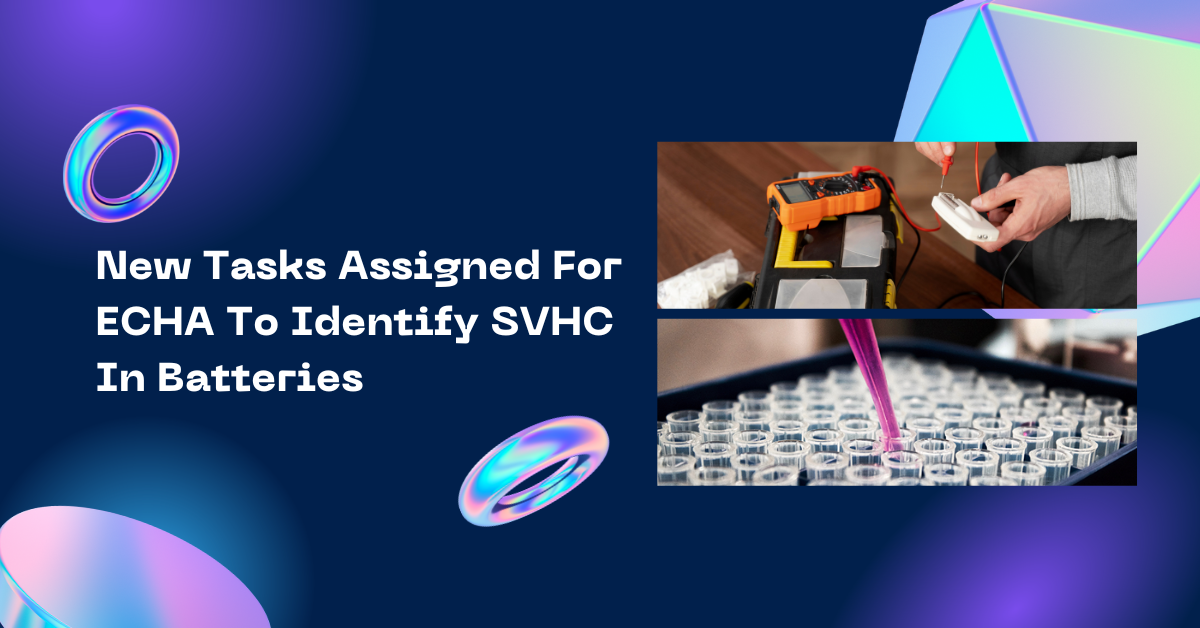
Batteries have become an integral part of our lives, empowering our lives, from vehicles to mobile phones. However, it poses certain potential environmental risks impacting human lives. ECHA’s involvement in battery regulation is part of the EU’s broader efforts to address these concerns. This blog will explore the ECHA’s regulation of substances of very high concern (SVCH) in batteries and the new tasks assigned to ECHA to identify the same.
ECHA On Battery Regulation:
“The European Green Deal” was implemented on 11th December 2019 by the European Parliament and European Union Council, aiming for a prosperous society. The regulation enhances sustainability guidelines for both batteries and discarded batteries, encompassing the entire lifecycle from manufacture to recycling and reusability. Its primary objective is to guarantee that batteries adhere to safety, sustainability, and competitiveness standards.
The European Parliament and Council’s regulation will encompass all types of batteries, which include waste portable batteries, electric vehicle batteries, industrial batteries, as well as batteries used for SLI in machineries and vehicles, and batteries designed for lightweight modes of transportation such as e-mopeds, e-scooters, and electric bikes.
Regulations On Making Sustainable Batteries:
On 14th July 2023, The recently enacted legislation considers technological advancements. It anticipates forthcoming sectoral challenges, encompassing the complete lifespan of batteries, from their inception in the design phase to their eventual end-of-life stage.
With a capacity above 2kWh, a carbon footprint declaration and label are required for EV batteries, LMT batteries, & rechargeable industrial batteries.
-
Creating portable appliance batteries with a design that allows consumers to remove and replace them effortlessly.
-
Requirement of digital battery passport for EV, LMT, and industrial batteries above 2kWh capacity.
-
Implementation of due diligence policy to all economic operators.
-
More stringent objectives for the collection of portable battery waste.
-
The minimum quantities of materials reclaimed from discarded batteries.
-
Recycling materials from manufacturing and consumer waste in producing new batteries.
New Tasks Assigned For ECHA:
As the European Union’s regulatory framework for batteries undergoes modernization, ECHA has been entrusted with additional responsibilities to aid the European Commission.
-
It includes providing support in creating a commission report that examines substances of concern identified in batteries or employed during their production, which can adversely affect human health, the environment, or the recycling process aimed at securing safe and top-quality raw materials.
-
The anticipated report, due by 31st December 2027, will ascertain the substances in question and assess potential subsequent actions, including implementing Union-wide restrictions. The commencement of ECHA’s efforts to draft this report is projected to occur in 2024.
-
Moreover, the commission may request ECHA to draft restriction proposals concerning hazardous substances found in batteries and discarded batteries.
-
The agency may require a Risk Assessment and Socio-Economic Analysis for effectively managing risks and their impact on society.
Thus, ECHA takes all the possible steps in regulating batteries within the EU, ensuring their safe use and reducing environmental impact. Approach Sunstream to ensure you adhere to battery regulations and responsible resourcing through conflict mineral compliance.




 +1.585.935.7123
+1.585.935.7123 +91-804-148-6861
+91-804-148-6861